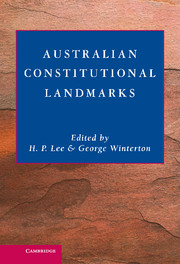Book contents
- Frontmatter
- Contents
- List of Cases
- List of Commonwealth Constitution Provisions
- List of Statutes
- List of Contributors
- Preface
- Introduction: The Commonwealth's Constitutional Century
- 1 The Emergence of the Commonwealth Constitution
- 2 The Engineers Case
- 3 The Uniform Income Tax Cases
- 4 The Bank Nationalisation Cases: The Defeat of Labor's Most Controversial Economic Initiative
- 5 The Communist Party Case
- 6 Fitzpatrick and Browne: Imprisonment by a House of Parliament
- 7 The Boilermakers Case
- 8 The Race Power: A Constitutional Chimera
- 9 The Double Dissolution Cases
- 10 1975: The Dismissal of the Whitlam Government
- 11 The Tasmanian Dam Case
- 12 The Murphy Affair in Retrospect
- 13 The Privy Council and the Constitution
- 14 Cole v Whitfield: ‘Absolutely Free’ Trade?
- 15 The ‘Labour Relations Power’ in the Constitution and Public Sector Employees
- 16 The Implied Freedom of Political Communication
- Index
16 - The Implied Freedom of Political Communication
Published online by Cambridge University Press: 07 October 2011
- Frontmatter
- Contents
- List of Cases
- List of Commonwealth Constitution Provisions
- List of Statutes
- List of Contributors
- Preface
- Introduction: The Commonwealth's Constitutional Century
- 1 The Emergence of the Commonwealth Constitution
- 2 The Engineers Case
- 3 The Uniform Income Tax Cases
- 4 The Bank Nationalisation Cases: The Defeat of Labor's Most Controversial Economic Initiative
- 5 The Communist Party Case
- 6 Fitzpatrick and Browne: Imprisonment by a House of Parliament
- 7 The Boilermakers Case
- 8 The Race Power: A Constitutional Chimera
- 9 The Double Dissolution Cases
- 10 1975: The Dismissal of the Whitlam Government
- 11 The Tasmanian Dam Case
- 12 The Murphy Affair in Retrospect
- 13 The Privy Council and the Constitution
- 14 Cole v Whitfield: ‘Absolutely Free’ Trade?
- 15 The ‘Labour Relations Power’ in the Constitution and Public Sector Employees
- 16 The Implied Freedom of Political Communication
- Index
Summary
On 30 September 1992, the High Court, with Sir Anthony Mason as Chief Justice, handed down the reasons for its decisions in two cases: Nationwide News Pty Ltd v Wills and Australian Capital Television Pty Ltd v Commonwealth. What emerged from these decisions was a judicial recognition of an implied constitutional freedom of political communication or discussion. This recognition was hailed by the Canberra Times as ‘a landmark in Australian constitutional history’. Clearly, the judicial imprimatur to such an implied freedom represented a seismic shift in the constitutional jurisprudence of the High Court. This development has been both lauded and attacked. It has been described as an ‘unprecedented step’, and ‘the most remarkable feature of Australian constitutional development in the past decade’. In 1994 Professor M. J. Detmold went to the extent of claiming, ‘We have the good fortune now to have the most creative High Court in our history’. Other commentators have vigorously criticised this development as an unjustified intrusion into the legislative domain. Sir Garfield Barwick, a former Chief Justice of the High Court, claimed that the sovereignty of Parliament had been impaired and denounced the implication as being inconsistent with parliamentary democracy.
Nationwide and ACTV
Nationwide arose from a prosecution against the owner of a newspaper, the Australian, which had published an article headed ‘Advance Australian Fascists’. The article claimed that the work of Australian workers was regulated ‘by a mass of official controls, imposed by a vast bureaucracy in the ministry of labour and enforced by a corrupt and compliant “judiciary” in the official Soviet-style Arbitration Commission [now replaced by the Australian Industrial Relations Commission]’.
- Type
- Chapter
- Information
- Australian Constitutional Landmarks , pp. 383 - 411Publisher: Cambridge University PressPrint publication year: 2003
- 2
- Cited by



